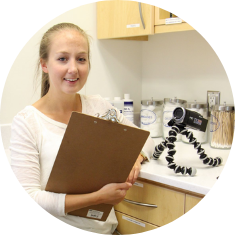
Lauren Dawson
Role: Conference Bursary Recipient
Department: Animal Biosciences
College: OAC
Conference Attended: 8th International Conference on the Assessment of Animal Welfare at Farm and Group Level
Location: Virtual
Value: $385
Research Presentation:
Due to selection, meat chickens (broilers) now reach a higher market weight at a younger age. Despite these advances in productivity, conventional broilers experience health and welfare problems, including leg and cardiovascular issues, and an inability to perform natural behaviours. With increasing consumer demand for welfare-friendly products, the sustainability of continuing to use fast-growing (conventional) broilers is under question; there has been increasing interest in using slower-growing strains. Our large scale study compiled data from over 7500 birds to directly compare the welfare of 16 different genotypes (conventional and slower-growing strains). I plan to present my work on the development of a new methodology for continuously assessing broiler activity levels through the use of wearable accelerometers. Inactivity is an indirect measure of animal welfare, and may be both a consequence of poor welfare (e.g. reduced ability to walk due to poor leg health) and a cause of poor welfare (e.g. hock and foot lesions due to extended periods of sitting, frustration due to the inability to perform motivated behaviours). Low inactivity levels, in correlation with other production and welfare measures, will identify strains with high welfare, meeting the Food from Thought objectives of improving productivity and increasing livestock health and welfare.
Objectives for Attending:
I am eager and excited to share my research results with leaders in the field of animal welfare science. In presenting my research, I hope to build connections with other animal welfare scientists, as well as other
individuals who are interested in applied approaches to improving animal welfare. Given the diverse audience, it will be a great opportunity to discuss my results and their implications with members from many stakeholder groups (i.e. scientists, industry, government, non-governmental organizations), while also showcasing the University of Guelph as a leader in sustainable agriculture research. Although the conference will be held in a virtual setting, I intend to maximize my networking opportunities by reaching out to presenters to ask questions and share insights, while also being continuously available throughout all conference hours to answer any questions that attendees may have about my work. I also plan to attend all virtual networking social events, where I will aim to interact with leading scientists in the field; my goal is to reach out to at least 3 individuals during each networking session. Beyond the networking
opportunities that attendance would afford me, I also intend to use the conference as an opportunity to expand my knowledge, particularly with respect to any novel approaches to assessing animal welfare at the group level, which I intend to bring back to Guelph to share with my colleagues.

